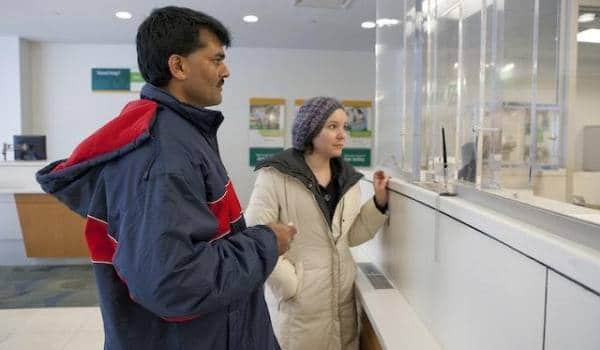Money Management
The cost of living in the United States varies greatly from one location to another, but in many places it can be high. This is why finding a job as soon as possible is very important for all adults who can work. You will need to be careful with your money, so that you do not spend more than you can afford. Learn more about Money Management in the United States below.

You may download this page as a PDF, watch, or listen to this information in a podcast. Downloadable PDFs, podcasts, and videos provide the same information as the webpage in different formats.
Most Americans keep their money in a bank because it is then insured by the U.S. Government. This means that if the money is lost or stolen from the bank, the U.S. Government will replace it. You will need to learn about electronic banking, credit, debt, budgeting, and paying taxes.
Banking
Banks offer a variety of services including accounts in which to hold your money. A checking account allows you to pay for your expenses using a check, a debit card, or through electronic bill paying. Most Americans find this safer and more convenient than carrying cash, but you should not spend more money than you have in the account. If you do, you will have to pay a fee.
A savings account is a way to put money aside for a long-term goal. You can still withdraw your money at any time, but you must go to the bank or use a debit card at an ATM (automated teller machine) to do so. These accounts may also have certain rules about how much money must remain in the account or how often and how much money you may withdraw.
Credit and Debt
There are several ways to borrow money in the United States. The most convenient way is to use a credit card, but there may be a low limit on how much you can borrow using a credit card, and you will have a short time to repay it without having to pay interest. For major loans, such as to buy a new car, many Americans apply for a loan directly from a bank.
There are important things to consider when borrowing money. If you borrow a small amount of money and pay off your loan quickly, you will build good credit history. The easiest way to do this is by using a credit card. Lenders use credit history to help them evaluate how likely it is that you will repay your debts. If your credit history is good, it will be easier for you to get a loan for something like a car.
However, if you have difficulty making your loan payments on time, you may face legal consequences. In addition, you must pay interest on most loans which increases the amount of money you must repay.
What is interest?
Interest is a percentage of the amount of borrowed money which is paid to the lender for the privilege of using their money. Interest rates vary. When you borrow money (by using a credit card or by taking out a loan from a bank), you will pay interest. Short term loans and credit cards usually have higher interest rates than long-term loans from a bank. Calculating interest on a loan is an important part of developing loan repayment plans and should always be considered when taking out a loan.
When you put money in certain savings accounts, you may earn interest since the bank uses your money to lend to others. Higher interest rates on savings accounts usually come with restrictions about how much and when you can withdraw your money.
Credit and Debit Cards
Debit cards and credit cards look almost the same, but there is one important difference. Both can be used to pay for items in person or over the internet, but a debit card withdraws money directly from your savings or checking account. A credit card lends you money for the purchase and if you don’t pay the balance due on your credit card statement every month, you will have to pay interest.
Your Travel Loan
Refugees are eligible to receive an interest-free loan to pay for their travel to the United States. For this loan, you are asked to sign a promissory note in which you agree to repay the loan within 46 months. You will receive the initial bill within six months of your arrival to the U.S. Repaying your travel loan by making prompt monthly payments is your first opportunity to build good credit history in the United States. If you have a problem making a payment, tell your resettlement office immediately.
Budgeting
You are responsible for managing your own personal finances, but the staff at your Resettlement Agency can help you make a budget. A budget will help you know how much money you have, how much you can spend, and how much you can save.
Every month you will need to pay for your basic living costs and other expenses. If you have long-term goals such as buying a home, as soon as you have enough to cover your basic expenses, you may want to put a certain amount into a savings account every month.

Paying Taxes
Taxes in the United States pay for many of the services used by all residents, including refugees. Taxes pay for public education; maintenance of roads and highways; police, fire, and emergency services; and social service programs.
People living in the United States pay three kinds of taxes:
Income taxes. Every working person pays federal income tax, and residents of some states pay a state income tax. These taxes are taken out of your paycheck by your employer.
Personal property taxes. Local governments may collect property taxes on homes, land, and buildings that you own. Your landlord pays these taxes on the property you rent. Some local governments also collect property taxes on automobiles.
Sales taxes. In most states, people pay a sales tax on things they buy. A sales tax is in addition to the cost of the item. In some states, there is no sales tax on certain categories of items, such as food or medicine. For other items, such as cigarettes and alcohol, the tax rate may be higher.
Ready to test your knowledge?
More ways to learn
With interactive lessons and videos, there’s always something new to discover. Settle In makes it fun to learn about resettling in the United States. Learn at your own pace – we’re here to guide the way.








